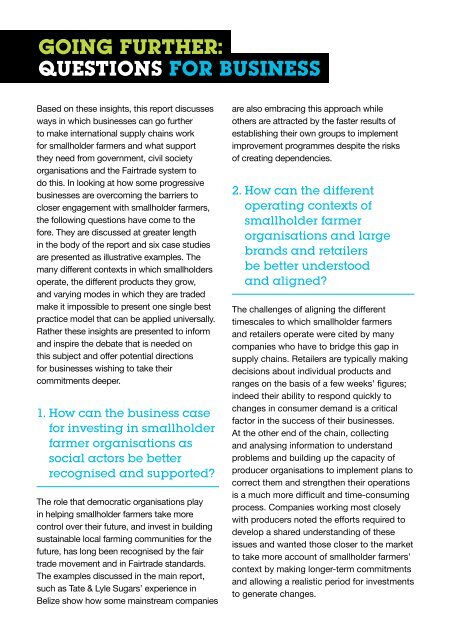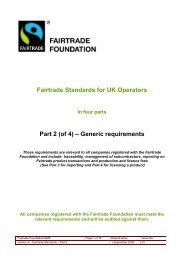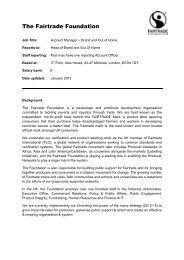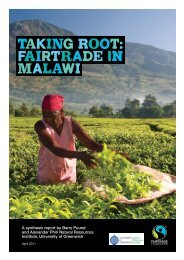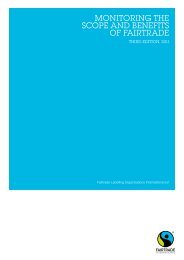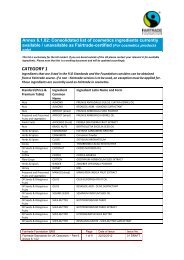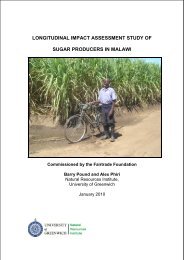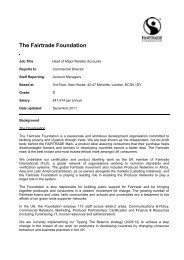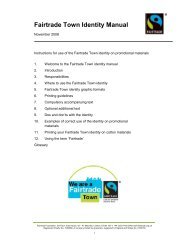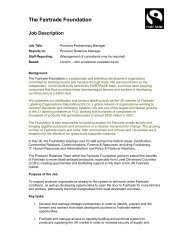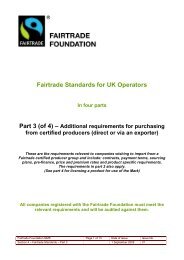executive summary - The Fairtrade Foundation
executive summary - The Fairtrade Foundation
executive summary - The Fairtrade Foundation
Create successful ePaper yourself
Turn your PDF publications into a flip-book with our unique Google optimized e-Paper software.
going furtHer:<br />
Questions for business<br />
Based on these insights, this report discusses<br />
ways in which businesses can go further<br />
to make international supply chains work<br />
for smallholder farmers and what support<br />
they need from government, civil society<br />
organisations and the <strong>Fairtrade</strong> system to<br />
do this. In looking at how some progressive<br />
businesses are overcoming the barriers to<br />
closer engagement with smallholder farmers,<br />
the following questions have come to the<br />
fore. <strong>The</strong>y are discussed at greater length<br />
in the body of the report and six case studies<br />
are presented as illustrative examples. <strong>The</strong><br />
many different contexts in which smallholders<br />
operate, the different products they grow,<br />
and varying modes in which they are traded<br />
make it impossible to present one single best<br />
practice model that can be applied universally.<br />
Rather these insights are presented to inform<br />
and inspire the debate that is needed on<br />
this subject and offer potential directions<br />
for businesses wishing to take their<br />
commitments deeper.<br />
1. How can the business case<br />
for investing in smallholder<br />
farmer organisations as<br />
social actors be better<br />
recognised and supported?<br />
<strong>The</strong> role that democratic organisations play<br />
in helping smallholder farmers take more<br />
control over their future, and invest in building<br />
sustainable local farming communities for the<br />
future, has long been recognised by the fair<br />
trade movement and in <strong>Fairtrade</strong> standards.<br />
<strong>The</strong> examples discussed in the main report,<br />
such as Tate & Lyle Sugars’ experience in<br />
Belize show how some mainstream companies<br />
are also embracing this approach while<br />
others are attracted by the faster results of<br />
establishing their own groups to implement<br />
improvement programmes despite the risks<br />
of creating dependencies.<br />
2. How can the different<br />
operating contexts of<br />
smallholder farmer<br />
organisations and large<br />
brands and retailers<br />
be better understood<br />
and aligned?<br />
<strong>The</strong> challenges of aligning the different<br />
timescales to which smallholder farmers<br />
and retailers operate were cited by many<br />
companies who have to bridge this gap in<br />
supply chains. Retailers are typically making<br />
decisions about individual products and<br />
ranges on the basis of a few weeks’ figures;<br />
indeed their ability to respond quickly to<br />
changes in consumer demand is a critical<br />
factor in the success of their businesses.<br />
At the other end of the chain, collecting<br />
and analysing information to understand<br />
problems and building up the capacity of<br />
producer organisations to implement plans to<br />
correct them and strengthen their operations<br />
is a much more difficult and time-consuming<br />
process. Companies working most closely<br />
with producers noted the efforts required to<br />
develop a shared understanding of these<br />
issues and wanted those closer to the market<br />
to take more account of smallholder farmers’<br />
context by making longer-term commitments<br />
and allowing a realistic period for investments<br />
to generate changes.


